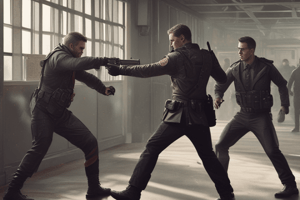Podcast
Questions and Answers
Which is the most common threat group a street officer will come in contact with?
Which is the most common threat group a street officer will come in contact with?
- Terrorist groups
- Street gangs (correct)
- Corporate criminals
- Political activists
What are the combat performance variables that impact survival?
What are the combat performance variables that impact survival?
Mindset, Motor skills, Nutrition & Hydration, Fitness, Belief System
What are the fatal errors identified by Caliber Press regarding suspect contact?
What are the fatal errors identified by Caliber Press regarding suspect contact?
Failure to watch suspects' hands, Failure to maintain equipment and self, Improper use of cuffs / searches, Missing danger signs, Relaxing too soon, Bad position / bad approach, Sleeping / drowsiness, Preoccupation, Tombstone courage, Apathy or complacency
What are the effects survival stress has on motor performance?
What are the effects survival stress has on motor performance?
What effects does survival stress have on visual performance?
What effects does survival stress have on visual performance?
According to HFS research, what are the effects of survival stress on cognitive performance?
According to HFS research, what are the effects of survival stress on cognitive performance?
What triggers SNS activation?
What triggers SNS activation?
List the threat perceptions.
List the threat perceptions.
List the fear perceptions.
List the fear perceptions.
Define homeostasis.
Define homeostasis.
Identify at least three methods that an officer can use to reduce survival stress.
Identify at least three methods that an officer can use to reduce survival stress.
State the various methods, both physical and mental, to prepare for survival.
State the various methods, both physical and mental, to prepare for survival.
Explain the importance of mental rehearsal in survival preparedness.
Explain the importance of mental rehearsal in survival preparedness.
What are the sources of stress law enforcement officers should expect to face?
What are the sources of stress law enforcement officers should expect to face?
Identify the benefits of stress management for the officer and the agency.
Identify the benefits of stress management for the officer and the agency.
Identify basic elements and techniques one can use to relieve or eliminate the effects of stress on work performance and personal health.
Identify basic elements and techniques one can use to relieve or eliminate the effects of stress on work performance and personal health.
Define ethics.
Define ethics.
Define character.
Define character.
What are acronyms for the A.C.T Model?
What are acronyms for the A.C.T Model?
What is a stakeholder?
What is a stakeholder?
What are the Ethical Choice Strategies according to Blanchard and Peale?
What are the Ethical Choice Strategies according to Blanchard and Peale?
What are the Ethics Check Questions according to Blanchard and Peale?
What are the Ethics Check Questions according to Blanchard and Peale?
What are common statements neutralizing ethical conflict? (Excuses)
What are common statements neutralizing ethical conflict? (Excuses)
What are the five P's of Ethical Power according to Blanchard and Peale?
What are the five P's of Ethical Power according to Blanchard and Peale?
Flashcards are hidden until you start studying
Study Notes
Threat Groups
- Most common threat group encountered by street officers are street gangs, classified as community threat groups.
Combat Performance Variables
- Key variables impacting survival include mindset, motor skills, proper nutrition & hydration, physical fitness, and belief system.
Fatal Errors in Suspect Contact
- Critical errors identified include:
- Not watching suspects’ hands
- Failing to maintain self and equipment
- Improper cuffing/searching techniques
- Missing danger signs
- Relaxing too soon and bad positioning
- Allowing drowsiness or preoccupation
- Tombstone courage and apathy/complacency
Survival Stress Effects on Motor Performance
- Survival stress impacts motor performance in three key areas: fine motor skills, complex motor skills, and gross motor skills.
Survival Stress Effects on Visual Performance
- Visual performance can deteriorate under survival stress, resulting in:
- Tunnel vision and loss of near vision
- Difficulty focusing and loss of monocular vision
- Impaired depth perception and night vision
Cognitive Performance Under Stress
- Survival stress affects cognitive performance, including perceptual senses and memory framework.
SNS Activation Triggers
- Triggers for sympathetic nervous system (SNS) activation include:
- Objective threat and fear perception
- Physical exhaustion and startle response
Threat and Fear Perceptions
- Key threat perceptions involve proximity, time constraints, lack of confidence in abilities, and novelty of the experience.
- Fear perceptions include fears of death, injury, killing, making wrong decisions, failure, and fear itself.
Homeostasis
- Homeostasis refers to achieving a balance between the sympathetic and parasympathetic nervous systems, promoting relaxation.
Methods to Reduce Survival Stress
- Officers can reduce survival stress through:
- Building confidence, selecting appropriate motor skills (KISS principle), tactical breathing, visualization drills, and faith factor.
Preparing for Survival
- Preparation methods include tactics, physical fitness, shooting skills, and mental conditioning/rehearsal.
Importance of Mental Rehearsal
- Mental rehearsal enhances confidence by enabling officers to visualize successful outcomes and allows for quicker, more efficient reactions in real situations.
Sources of Stress for Law Enforcement
- Common stress sources include self-perception, family, social, departmental, and societal expectations.
Benefits of Stress Management
- Effective stress management yields increased confidence and improved situational handling for both officers and agencies.
Techniques to Relieve Stress
- Basic techniques to relieve stress impacts involve:
- Mindset, proper nutrition & hydration, fitness, belief systems, and motor skill selection.
Ethics Definition
- Ethics is defined as a code of values guiding choices, decisions, actions, and behaviors, shaping life purpose and direction.
Character Definition
- Character encompasses the features and traits forming an individual's nature.
A.C.T Model
- Acronyms stand for:
- Alternatives, Consequences, and Tell your Story.
Stakeholders
- Stakeholders are individuals or organizations affected by actions taken.
Ethical Choice Strategies (Blanchard and Peale)
- Strategies include The Bell, The Book, and The Candle.
Ethics Check Questions (Blanchard and Peale)
- Questions to consider:
- Is it legal?
- Is it balanced?
- How will it make me feel about myself?
Neutralizing Ethical Conflict Statements
- Common excuses include:
- Denial of responsibility or injury, denial of the victim, condemning the condemners, and appealing to higher loyalties.
Five P's of Ethical Power (Blanchard and Peale)
- The pillars consist of Purpose, Pride, Patience, Persistence, and Perspective.
Six Pillars of Character
- The six pillars encompass core ethical values that guide behaviors and decisions.
Studying That Suits You
Use AI to generate personalized quizzes and flashcards to suit your learning preferences.




